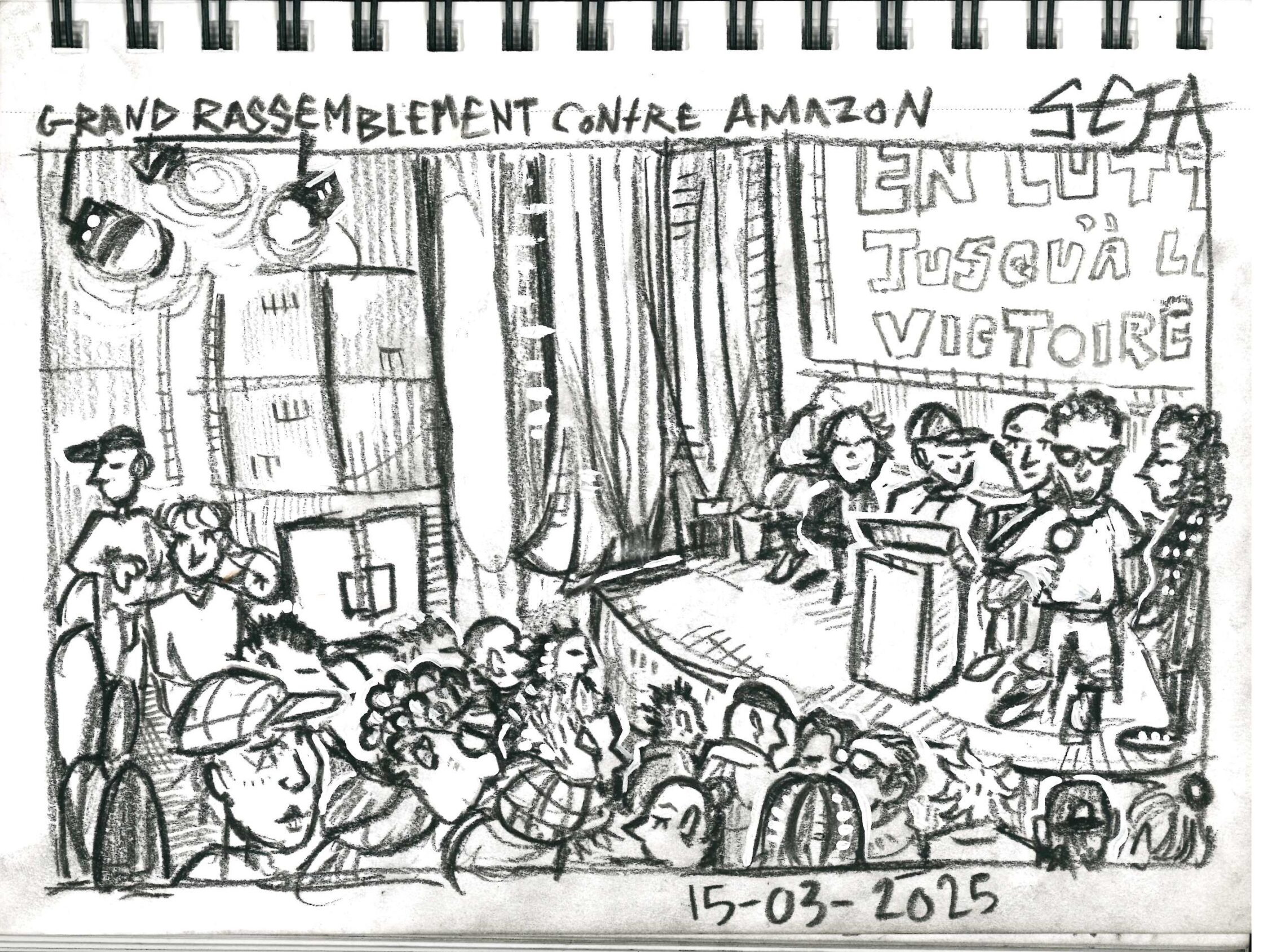Amazon’s crusade against its employees reached a peak this winter in Quebec. To block a collective agreement at its DXT4 warehouse in Laval, the American giant shut down all operations in the province and fired more than 4,500 workers. In the face of this attack, a movement of opposition unprecedented in 30 years for this type of closure erupted. That movement is now gearing up for a week of action under the slogan: “In struggle until final victory”.
But first, a little background is in order.
The North Star covered these important events every step of the way, starting in the spring of 2024, when workers at the Laval warehouse made history by becoming the first employees of the multinational to unionize in Canada.
Within months of certification, Amazon laid off 30 DXT4 workers. As if that weren’t enough, it also withheld wage increases that had been granted to all other Amazon warehouses in Quebec.
During negotiations with the union, Amazon rejected all the proposals put forward by the workers, even on clauses that would normally not be a point of dispute. The workers reacted by staging a series of demonstrations outside their warehouse.
If the union had succeeded in securing a collective agreement, it would have been the first Amazon union in the world to do so. Amazon’s bosses clearly found this unacceptable and wanted to send a message internationally. At the end of January, Amazon Canada’s lawyers announced the definitive cessation of their activities in Quebec. Over 4,500 Quebec workers were laid off in the following six weeks.

The boycott campaign
Less than 24 hours after the closures were announced, a movement called “Here, we boycott Amazon” took off across Quebec. Led by activists from diverse backgrounds and backed by Workers’ Alliance—a group campaigning for a more democratic, political and offensive trade union movement—the campaign handed out tens of thousands of flyers and organized three protests in just six weeks.
Meanwhile, a group of workers picketed the warehouse for two weeks. Frustrated by the CAQ government’s inaction, they joined the boycott movement and disrupted several events, including a fancy luncheon for the Minister of Labour. Their pressure forced a meeting with the Minister, who said he was powerless to act. “Ministers are notorious for having no power,” joked a spokesperson.
The movement also targeted Intelcom, Amazon’s main subcontractor in Quebec. In early February, the Amazon union, Workers’ Alliance and the boycott campaign occupied Intelcom’s Anjou warehouse. A month later, they blocked deliveries to five Intelcom sites across the province for over an hour.
Unions and activists united
On March 15, the boycott movement held a large assembly at the Maison Théâtre in Montreal. The assembly brought together more than 250 workers and union leaders from a broad range of industries in both the public and private sectors.
Speakers included union representatives active in recent struggles. The CSN was represented by Concordia teaching assistants, daycare workers and hotel employees. CUPE was represented by Montreal transit workers. All stressed the importance of solidarity in the face of growing attacks on the working class.
After an electric night, Benoit Dumais, spokesperson for Workers’ Alliance, who co-organized the assembly, addressed the audience: “If the bosses, the state and the government want to go back 100 years, the labour movement too will go back to its roots. We’ll go back to the methods of struggle we had when we built the workers’ movement. We will return to combative unions, class struggle unions.”
Dumais announced the next stage in the Amazon boycott campaign, the week of action from April 27 to May 3: “We’ll be taking action every day, for the demands of Amazon workers and democratic demands in opposition to the CAQ’s reform. We call on our members, our allies in the workers’ movement, and the people in general to answer the call and put maximum effort into giving the CAQ a good fucking smack.”
A breath of fresh air for the labour movement
With back-to-work orders raining down at the federal level and reforms attacking working-class rights coming from all levels of government, this assembly was a breath of fresh air: a core of determined union activists declared with rare confidence and determination that they would fight tooth and nail against the oligarchs and their political lapdogs.
For three years now, our journalists have been on the ground reporting on the struggles of people across the country. The North Star can attest to this: this battle cry testifies to widespread resentment among the Canadian working class, who are fed up with being swindled by their bosses and political leaders.
For now, the organized labour movement does not seem to have the capacity to respond to this situation with the necessary force it once had, but it can acquire it. The North Star firmly believes it can, and indeed must. Hopefully, the week of action proposed by the Workers’ Alliance will be the start of something big.


Be part of the conversation!
Only subscribers can comment. Subscribe to The North Star to join the conversation under our articles with our journalists and fellow community members. If you’re already subscribed, log in.